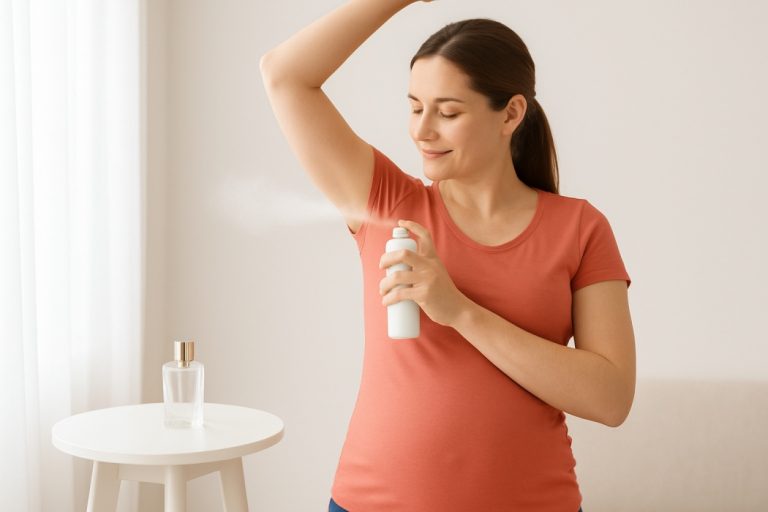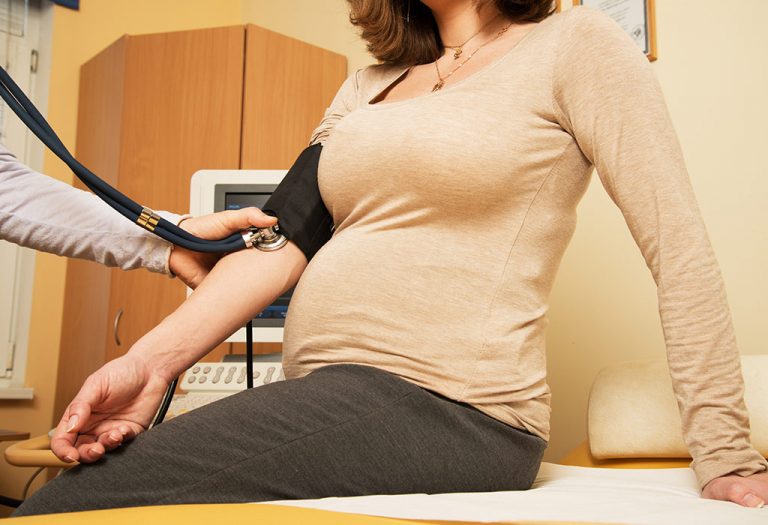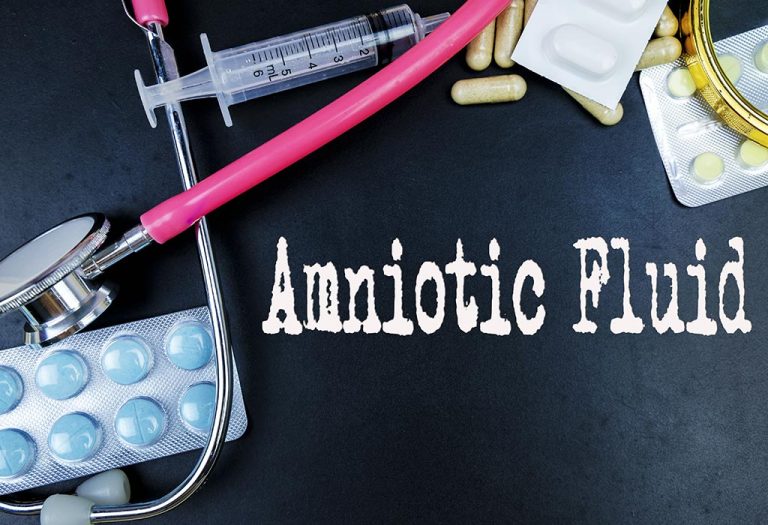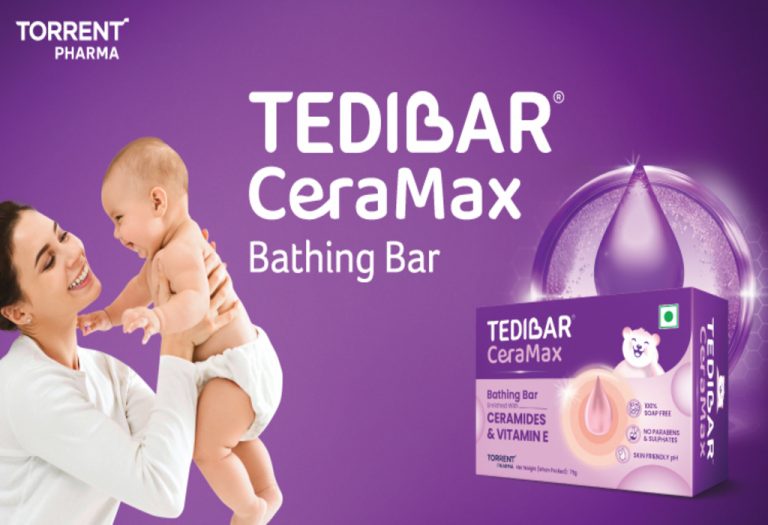Using Perfume and Deodorant During Pregnancy – Is It Safe?
Pregnancy often brings more sweating. Find out how to choose a deodorant that keeps you fresh while staying pregnancy-safe.

Being odour-free is part of maintaining good personal hygiene. But, regular commercial perfumes and deodorants may not be entirely appropriate to use during pregnancy. They usually contain toxins and chemicals, which can penetrate the skin through minor skin abrasions or get absorbed by the skin when applied during pregnancy, possibly leading to complications.
The extent of exposure to these toxic chemicals also matters. Usually, perfumes and deodorants are applied every day and remain on the skin for a long time. Moreover, pregnant women normally develop a heightened sense of smell and may become sensitive to certain fragrances (1). Therefore, applying strong deodorants and perfumes during pregnancy can trigger nausea and headaches. But, in the phase when an expectant mother doesn’t experience nausea anymore, is it still safe to use perfume or deodorant while pregnant? Let’s find out!
Is It Safe to Use Deodorants and Perfumes During Pregnancy?
The common questions that surface on the internet are like, ‘Is deodorant safe in pregnancy?’ ‘Is perfume safe during pregnancy?’
Yes, it is normally considered safe to use perfumes and deodorants during pregnancy (2). Most doctors are of the view that the chemicals contained in deodorants and perfumes do not infiltrate the skin but stay on the skin’s surface. Even if there are minor cuts on the skin, not enough of the toxins may pass into the body to cause any substantial damage to the mother or the fetus. However, use natural perfumes rather than chemical-laden ones, as some strong chemicals can be absorbed by the skin, even if there are no cuts.
However, one needs to be wary of perfume or deodorant in pregnancy as it may trigger an allergic reaction during pregnancy. Ideally, those that are organic and contain all-natural ingredients should be preferred when pregnant. We have provided some ingredients that you should avoid completely in the article below. However, if you have queries, it is wise to consult a doctor first before using the product.
What Perfumes or Deodorants Should You Avoid?
Although the use of perfumes or deodorant for pregnant women is usually considered safe, there may be some that you can still avoid.
- Refrain from using camphor, aniseed, pennyroyal, birch, wintergreen, and sage essential oils while pregnant.
- Avoid using perfumes or deodorants that contain harmful chemicals such as silica, parabens, BHA, sodium lauryl sulfate, coal tars, petroleum by-products, propylene glycol, triclosan, polyethene/pegs, and formaldehyde during pregnancy.
- Select an aluminium-free deodorant or perfume. Studies have linked aluminium-based compounds to a higher risk of neurological diseases like Alzheimer’s disease, gene instability, and breast cancer (3). A 2018 study published in the International Journal of Environmental Research and Public Health even concluded that AI is toxic and harmful in all pregnancy stages and may produce irreversible health effects even when the exposure is minimal (4).
- Choose unscented perfumes and deodorants instead of the fragrant ones. Fragrances usually have hormone-disrupting phthalates as an ingredient. Sometimes, phthalates may not be listed on the product’s label. Even deodorants claiming to be phthalate-free may contain unknown phthalate substitutes that can cause potential harm during pregnancy.
With pregnancy come limitations. Most things, including deodorants and perfumes, should also be limited. Of course, you may speak to your medical practitioner to know if it is safe for you to use them, but when the expert does permit it, you may want to still limit its use. Some ways to limit fragrances are mentioned below.
What Amount of Perfumes or Deodorants Should You Use?
During pregnancy, it is wise to follow the norm – Better safe than sorry! It is safer to limit the number of deodorants and perfumes that you apply every day when pregnant. American Pregnancy Associaion suggests the keeping the environment fragrance-free until you discover scents that do not make you nauseous (2). Avoid excessive use of deodorants and perfumes during pregnancy, especially if you are indulging in scented lotions and creams as well. It is best to stick to the minimal use of aromatic products. Avoid experimenting with new products. You can try using safer essential oils like diluted citrus oil instead of heavily fragrant deodorants and perfumes only after the doctor’s consultation.
Read on to learn some more safe essential oils you can consider using during your pregnancy instead of deodorants and perfumes.
Risks of Using Deodrants and Perfumes During Pregnancy
During pregnancy, the sense of smell heightens, which might make deodorants, perfumes, or antiperspirants smell stronger than usual. This could make you feel nauseous and even lead to vomiting, tiredness, headaches, and trouble breathing. Especially in the first three months of pregnancy, using too many of these scented products can worsen morning sickness, so it’s best to avoid them.
Perfumes are made of lots of different chemicals, like phthalates, which can cause problems with hormones, breathing, or skin. Perfumes with lots of alcohol can also be harsh on your senses. Some fragrances contain parabens, which have been linked to birth defects in some cases. Both phthalates and parabens can mess with your hormones and affect fertility in women or the development of male babies. A study conducted by the National Institutes of Health concluded that phthalates exposure during pregnancy could lead to preterm birth (5). Make sure to check the ingredients on the bottle or can and avoid these chemicals, especially phthalates, because they can get into your bloodstream and cause issues. In fact, phalates are known to have caused a decrease in circulating thyroid hormones in pregnant women as per a published study (6).
Some Safe Natural Fragrances You Should Try
Natural fragrances may not work like conventional perfumes and deodorants. But, the longer you use natural fragrances, the better they may work. Natural fragrances are available in jars, sprays, roll-ons, or sticks. Some of the ingredients that make the best natural deodorant women can use during pregnancy are:
- Coconut Lime
- Cinnamon
- Balsam
- Cucumber Melon
- Passion Fruit
- Cranberry
- Green Tea
- Hibiscus
- Cocoa butter
- Mango butter
- Juniper
- Tea tree oil
- Lichen oil
- Rosemary oil
- Citrus oil
- Fig
- Peach
- Lemon Mint Leaf
- Lilac
- Raspberry
- Cherry
- Chamomile oil
- Lavender oil
- Sandalwood
- Rose
- Spearmint
- Ylang-Ylang
- Geranium
- Honey Apple
- Frankincense
Ensure you go for a trustable brand when choosing antiperspirant for pregnancy. But, remember that even organic fragrances can cause issues, such as the ones given below, indicating that you need to make another visit to the doctor.
When Should You Consult the Doctor?
You may like to consult the doctor if you experience any of the following listed reactions after using a deodorant or perfume:
- Headache
- Skin Rashes
- Allergic reaction
- Difficulty in breathing
- Choking
Also, discuss your possible triggers or allergies if any, and based on your medical history, your doctor can suggest a pregnancy-safe deodorant for you.
FAQs
1. Why do pregnant women have smelly armpits?
The increased hormonal activity during pregnancy is one of the reason for increased sweat and body odour during pregnancy. The estradiol hormone secereted during pregnancy makes sweat and sebaceous glands work overdrive. Another reason could be stress because of which sweat glands secrete more fatty acids. Addtionally, medications or tonics consumed during pregnancy can also lead to the creation of unpleasant body odours. Any of the before-mentioend reason could lead pregnant women to have smelly odour in their sweat, however, this could not be true for all individuals are different.
2. Can I use a deodorant roll-on during pregnancy?
Deodorant rollers contain alcohol and chloride salts that prevent sweat secretion, perfume that could worsen morning sickness and nausea, and harmful chemicals like aluminium that are not safe for either the pregnant mother or the baby. Therefore, it is best to stick to deodorant rollers with natural fragrances and ingredients and avoid ones that contain harmful chemicals like parabens, phthalates, synthetic fragrances, triclosan, and synthetic colours.
3. How to buy a pregnancy safe deodorant?
When buying a perfume or deodorant, make sure the products have these ingredients:
- Vegetable Starch
- Essential Oils
- Plant Oils
- Activated Charcoal
- Baking Soda
- Magnesium
- Zinc
- Probiotics
4. Is it safer to apply perfume on clothes instead of skin?
Yes. Spraying perfume on clothes reduces direct skin exposure and can help avoid irritation. It also keeps the scent lighter and less overwhelming, which is helpful if you’re sensitive to strong smells. Many people also prefer this approach during pregnancy, especially when thinking about deodorant and pregnancy safety.
It is always sensible to be safe, and thus, using perfumes and deodorants in minimal quantities during pregnancy may be a better idea. It is also important to check out the labels on the products before buying them. You can also opt for mild fragrances instead of strong ones. Furthermore, during pregnancy, you may like to switch over to natural fragrances which are devoid of detrimental chemicals to avoid any likely health issues.
Also Read:
Nail Polish during Pregnancy
Using Lavender when Pregnant
Toxic Chemicals You Must Avoid while Pregnant
Spices You Can Consume and Avoid in Pregnancy
Was This Article Helpful?
Parenting is a huge responsibility, for you as a caregiver, but also for us as a parenting content platform. We understand that and take our responsibility of creating credible content seriously. FirstCry Parenting articles are written and published only after extensive research using factually sound references to deliver quality content that is accurate, validated by experts, and completely reliable. To understand how we go about creating content that is credible, read our editorial policy here.




































